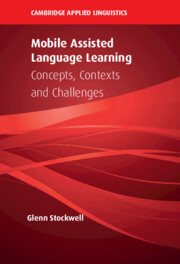Book contents
- Mobile Assisted Language Learning
- The Cambridge Applied Linguistics Series
- Mobile Assisted Language Learning
- Copyright page
- Dedication
- Contents
- Figures
- Tables
- Acknowledgements
- Abbreviations
- 1 Introduction
- 2 Fundamental Considerations of Teaching with Mobile Technologies
- 3 Shifting Paradigms in Language Learning and Teaching
- 4 Research Considerations in MALL
- 5 Theory in MALL
- 6 Physical, Psychosocial and Pedagogical Issues
- 7 The Learner in MALL
- 8 Designing MALL Environments
- 9 Concepts, Contexts and Challenges in MALL
- Glossary
- References
- Index
4 - Research Considerations in MALL
Published online by Cambridge University Press: 23 December 2021
- Mobile Assisted Language Learning
- The Cambridge Applied Linguistics Series
- Mobile Assisted Language Learning
- Copyright page
- Dedication
- Contents
- Figures
- Tables
- Acknowledgements
- Abbreviations
- 1 Introduction
- 2 Fundamental Considerations of Teaching with Mobile Technologies
- 3 Shifting Paradigms in Language Learning and Teaching
- 4 Research Considerations in MALL
- 5 Theory in MALL
- 6 Physical, Psychosocial and Pedagogical Issues
- 7 The Learner in MALL
- 8 Designing MALL Environments
- 9 Concepts, Contexts and Challenges in MALL
- Glossary
- References
- Index
Summary
Research into MALL has proven to be somewhat complex when compared to much of the earlier research in the field of CALL, which is the focus of this chapter. The reasons for this are twofold. Firstly, by the nature of the device, there is an expectation that a significant proportion of learning through mobile devices will take place out of class. While this does not preclude using devices in classroom settings (and there have been several very interesting studies that have looked at the use of mobile devices in class), it is exponentially more difficult to determine how learners are using their mobile devices in uncontrolled and unsupervised settings. Secondly, learners are typically using their own devices,whereas early studies into mobile devices typically involved using loaned devices, meaning that it is not logistically possible to install tracking software on them. The purpose of this chapter is to outline the difficulties involved with undertaking research in MALL and to describe various innovative approaches that have been undertaken, illustrated through appropriate recent examples from the literature.
- Type
- Chapter
- Information
- Mobile Assisted Language LearningConcepts, Contexts and Challenges, pp. 66 - 89Publisher: Cambridge University PressPrint publication year: 2022

